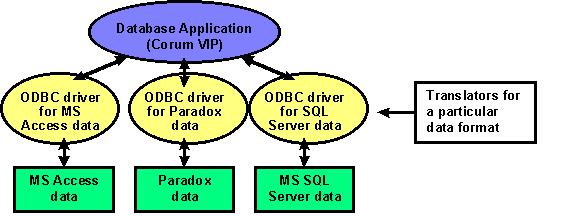
Open Database Connectivity (ODBC) is an industry standard interface that essentially allows you to communicate with any data source. An ODBC driver is developed to work with a specific data format so that it can act as a translator between the data source and the database application. In order for a database application to access a data source, it must go through an ODBC driver that understands the format of the data source it is using. The application-specific ODBC driver exists between a specific data source and a database application in the same way that a printer driver exists between an application and the printer.
For example, there is an ODBC driver developed to access MS Access data and there is an ODBC driver developed to access FoxPro data.
Because ODBC allows each database application to use the same function calls (the same methodology) to communicate with many types of data sources through application-specific ODBC drivers, you can use VIP Workshop to access dBASE, MS Access, or SQL Server data, or any other data source for which you have an ODBC driver that is ODBC level 2 compliant.

If you would like VIP Workshop to access data in a specific data format, that data formatís ODBC driver must be installed on your local computer. For steps on how to determine which ODBC drivers are installed, see Check for Installed ODBC Drivers.
ODBC Issues
VIP Workshop is a 32-bit Database Management System (DBMS) and thereby supports data sources that are 32-bit; thus, you must use a 32-bit ODBC driver to read that data.
Some data formats use different database models, which affects how the data source is connected to a table part in VIP Workshop. For more information, click here  .
.
ODBC Limitations
Each ODBC driver handles data for its specified data source slightly differently. How the following tasks are handled by VIP Workshop depend on the specific ODBC driver used. Contact the ODBC driver vendor for more information.